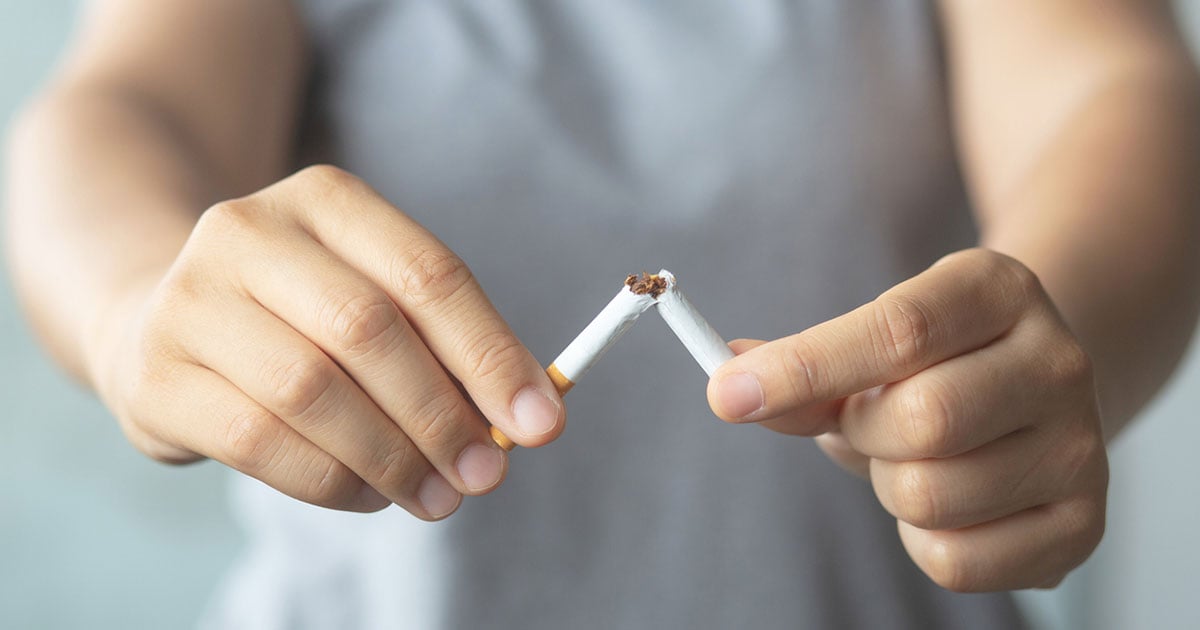
Lifestyle Medicine Can Help You Quit Smoking or Drinking
Quitting risky substances like alcohol and tobacco can make huge improvements in your health.
Advice to improve your movement, fitness, and overall health from the world's #1 in orthopedics.

Avoiding risky substances, such as tobacco and alcohol, is one of the six pillars of lifestyle medicine. If you've been trying to stop smoking or drinking or reduce your alcohol consumption, the lifestyle medicine approach may help. Heidi Prather, DO, who leads the HSS Lifestyle Medicine Program, shares information on the health risks of smoking and alcohol use and how lifestyle medicine can help you set—and achieve—attainable health goals.
What makes people most want to quit smoking?
Most smokers know that smoking causes heart disease, cancer, and other problems. But many are surprised to learn that smoking makes your pain feel worse. This happens because tobacco causes vasoconstriction—narrowing of the blood vessels—which reduces the blood supply, raises the levels of inflammatory proteins, and increases the perception of pain. When people hear this, it is a great motivator to stop smoking because they will experience improvement in their pain relatively quickly.
How do lifestyle medicine practitioners help people to stop smoking?
We screen all of our patients about their tobacco and alcohol consumption, and we ask them if they are interested in quitting or cutting back. If they want to quit smoking, we speak with them about their goals and preferences, and then match them with the technique that is most likely to be effective for them, such as medications, the nicotine patch, and/or counseling.
It can be overwhelming to stop smoking when you are also working on another goal at the same time, such as losing weight. So we help people to set short-term goals that are attainable. One of them is talking to someone about stopping smoking and starting a smoking cessation program. The second step is to set a goal to stop smoking that is reasonable. Saying "I want to quit smoking in two weeks and lose 20 pounds in two months" can be overwhelming for most people, so we work one-on-one with each person to determine what goals are best for them.
"Smart” goals are goals that are achievable and measurable. That's the way to go.
What level of alcohol intake is considered safe?
There is really no safe level, and the guidelines vary. The American College of Lifestyle Medicine (ACLM) recommends:
- No more than 4 drinks on any day or 14 drinks in 7 days for men
- No more than 3 drinks on any day or 7 drinks in 7 days for women
Binge drinking is defined as 5 drinks in 2 hours for men and 4 drinks in 2 hours for women.
One drink is considered:
- 12 oz of beer
- 5 oz of table wine
- 1.5 oz of 80-proof spirits
What is the best way to stop drinking?
A lifestyle medicine provider will speak with you about your alcohol consumption and, if you are looking to quit drinking or cut back, help you set goals that are best for you. You may be linked with resources such as 12-step programs or other support groups.
How does a lifestyle medicine physician help set goals?
The physician will learn what is important to you and help you understand that you need to be patient. Being patient with yourself and getting support from others is an important part of reaching your goals. Slips and relapses are a normal part of the process. Your physician will work with you to set goals that are:
- Specific: What are you going to do to decrease your substance use?
- Measurable: How much will you reduce it by?
- Attainable: Do you have what it takes to follow through?
- Realistic: What can you actually do? Focus on improvement over perfection.
- Time-connected: How frequently will you work on your goals? How long will you commit to the process?
If you are interested in stopping smoking or drinking or reducing your alcohol consumption, find out how lifestyle medicine may help you. Lifestyle Medicine services at HSS are provided in person and through telehealth. Call 212.774.7653 for more information.
Helpful Resources Recommended by the ACLM
National Quit Link: 1-800-Quit-Now
SmokeFree.gov: https://smokefree.gov/
NIAAA Alcohol Treatment Navigator: alcoholtreatment.niaaa.nih.gov
Alcoholics Anonymous (AA): www.aa.org
Published 4/21/2023


